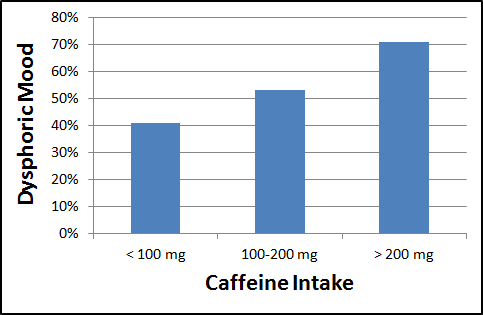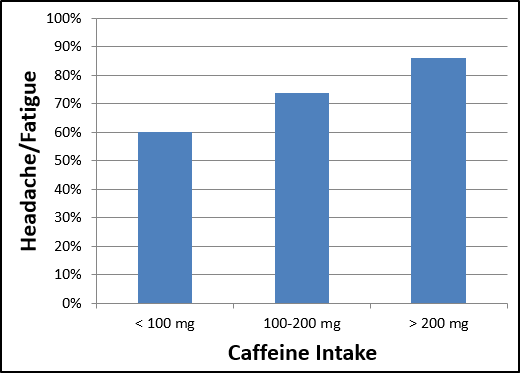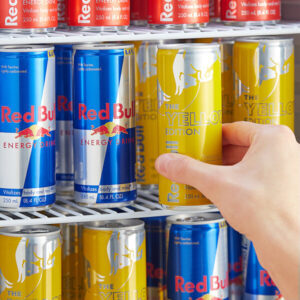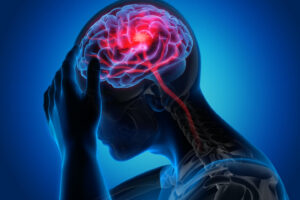 Most people I know regularly consume coffee. I never liked coffee because it would make my IBS worse, but I did take low-dose caffeine pills in the past. Recently, I suffered serious effects from caffeine withdrawal. For about four months straight, I consumed about 100–250 mg of caffeine per day. That is about 1–2.5 cups of coffee, or less than one strong Starbucks coffee. When I suddenly stopped taking the caffeine pills, I noticed a few adverse effects.
Most people I know regularly consume coffee. I never liked coffee because it would make my IBS worse, but I did take low-dose caffeine pills in the past. Recently, I suffered serious effects from caffeine withdrawal. For about four months straight, I consumed about 100–250 mg of caffeine per day. That is about 1–2.5 cups of coffee, or less than one strong Starbucks coffee. When I suddenly stopped taking the caffeine pills, I noticed a few adverse effects.
The withdrawal period lasted for about ten days. I was having daily heart palpitations, extreme and constant anxiety, had a few panic attacks when falling asleep, and was overall down and without energy. I was surprised that I had these effects because I assumed I did not take enough caffeine daily to have withdrawal symptoms. Perhaps I am more sensitive than most to the effects of caffeine. That is certainly possible. I became curious as to how common withdrawal symptoms were and decided to write this blog to find out.
Caffeine is a drug
- Neurotransmitters – brain chemicals that communicate information throughout our brain and body
Caffeine may be legal and natural, but it is still classified as a drug, specifically as a stimulant. Caffeine is commonly consumed worldwide and poses no immediate dangers to health (unless you drink over 100 cups of coffee at once). Caffeine increases alertness and can elevate mood. Caffeine may be addictive, but I will discuss that in another blog. In the future, I will also write in detail about the effect caffeine has on our brains and neurotransmitters to produce the alertness and elevated mood that we feel.
Thinking about how caffeine affects neurotransmitters is one of the reasons I stopped consuming it. Neurotransmitters are strictly regulated, and when they get out of whack, you can end up with depression, obsessive-compulsive disorder, bipolar disorder, etc. (I do not think caffeine causes any of these; I am just pointing out what happens when our neurotransmitters deviate from what they should be).
How much caffeine must we consume to feel withdrawal symptoms?
Obviously, this answer would vary by person (depending on how their body reacts to caffeine), but I am going to generalize the answer based on studies. It seems that higher daily intake of coffee (5+ cups a day) produces greater positive effects than lower daily intake (less than two cups per day), but also produces stronger negative effects when going for a long period without coffee (so the highs are higher and the lows are lower with a higher intake of caffeine) (1).
One study measured the effects of caffeine withdrawal on moderate coffee drinkers (2). In the first experiment, subjects were given 100 mg, 300 mg, or 600 mg of caffeine in a pill once daily (subjects did not know which group they were in). For each group, subjects received a placebo (a pill not containing caffeine) for two consecutive days to measure the effects of withdrawal. The study found that all subjects experienced withdrawal symptoms on their placebo days, but the intensity and range of side effects increased with higher dosages. Headache and poor mood increases were only seen in the 600 mg caffeine dose. Only observed at 300 mg and 600 mg were decreases in activity and alertness scores.
The same researchers also found that on days receiving a placebo, subjects consuming 300 mg of caffeine daily experienced higher rates of headache, tiredness, flu-like symptoms, fatigue, and decreases in alertness (3). They also measured the maintenance dose required to prevent withdrawal symptoms in subjects consuming 300 mg of caffeine daily. It was found that both 200 mg and 300 mg caffeine pills were able to prevent withdrawal symptoms.
- When 0 mg of caffeine was given instead of the normal 300 mg, subjects reported seven withdrawal symptoms
- When 25 mg of caffeine was given instead of the normal 300 mg, subjects reported three withdrawal symptoms
- At 50 mg they experienced one withdrawal symptom
- At 100 mg they experienced two withdrawal symptoms
Researchers found that caffeine withdrawal symptoms were evident following only three days of caffeine intake. Subjects began taking 300 mg of caffeine daily. Subjects then received a placebo after one day, three days, seven days, or fourteen days. There were no withdrawal symptoms after one day of caffeine intake. After three, seven, and fourteen days of caffeine exposure, both headache/poor mood and tiredness scores were significantly increased compared to subjects still taking 300 mg of caffeine daily.
Symptoms of caffeine withdrawal
There are over a dozen reported withdrawal symptoms but the most common include: anxiety, flu-like symptoms, muscle pain, headache, drowsiness, impaired concentration and decreases in feeling of contentment and sociability (3).
One study measured the effects of caffeine withdrawal on subjects consuming: <100 mg/day, 100-200 mg/day, and >200 mg/day (4).
-
- After stopping caffeine intake: Headache/Fatigue & Dysphoric Mood (state of unease or dissatisfaction) were measured.
Below are charts showing the percentage of people experiencing withdrawal effects when stopping caffeine intake


How long can withdrawal symptoms last?
I was not able to find any scientific studies addressing how long caffeine withdrawal can last. It is commonly believed that withdrawal can last from seven to nine days, while headaches can last up to three weeks.
Discussion
I was surprised to find out that we do not need to take a lot of caffeine to get withdrawal symptoms. I was even more surprised that we experienced withdrawal symptoms after taking caffeine for only three days. While withdrawal symptoms may be unpleasant, they are not dangerous. Even so, I do not like the fact that our body becomes so accustomed to caffeine after such a short period. Now that I have been caffeine-free for a few months, I feel back to normal. No more heart palpitations, anxiety, or body jerks. I will still keep caffeine pills, but I will only use them if I really need them.
If anyone has experienced caffeine withdrawal, please feel free to leave a comment. I am interested in finding out if anyone had similar withdrawal symptoms as I did (I feel that I am overly sensitive to caffeine).
Sources
- Richardson, N. J., Rogers, P. J., Elliman, N. A., & O’Dell, R. J. (1995). Mood and performance effects of caffeine in relation to acute and chronic caffeine deprivation. Pharmacology Biochemistry and Behavior, 52(2), 313-320.
- Griffiths, R. R., Evans, S. M., Heishman, S. J., Preston, K. L., Sannerud, C. A., Wolf, B., & Woodson, P. P. (1990). Low-dose caffeine physical dependence in humans. Journal of Pharmacology and Experimental Therapeutics, 255(3), 1123-1132.
- Evans, S. M., & Griffiths, R. R. (1999). Caffeine withdrawal: a parametric analysis of caffeine dosing conditions. Journal of Pharmacology and Experimental Therapeutics, 289(1), 285-294.
- Ozsungur, S., Brenner, D., & El-Sohemy, A. (2009). Fourteen well-described caffeine withdrawal symptoms factor into three clusters. Psychopharmacology, 201(4), 541-548.




How much will be the relation between caffeine in a Coke vs. a cup of coffee? Just to make the comparative analysis
Thanks Rob !
Hey Bernal Caffeine in a soda will typically be less than that in coffee. A 12 oz can of coke has about 29 mg, while a 20 oz coke has about 76 mg- but certain sodas will have higher or lower amounts of caffeine. One 8 oz cup of coffee has 95 mg of caffeine. How you brew your coffee can make a huge difference though!
I’m in high school, and drinking a cup of coffee helps me stay focused. On average, I drink about 3-4 cups of strong but dark roast coffee (apparently dark roast has less caffeine) a month while I’m working on difficult assignments. Will continuing this have any withdrawal symptoms, and 2) over time, will this increase my tolerance to caffeine, therefore decreasing its effect?
Hi Sarah. Thanks for the question!
Roast refers to how strong of a flavor the coffee has. The longer the bean has been roasted the stronger the taste. The longer a bean is roasted the more caffeine is lost, so light roast contains more caffeine than dark roast beans, as you mentioned.
If you are only drinking 3-4 cups of coffee a month you will not have withdrawal symptoms. You would need to drink coffee for a few days in a row to possibly have withdrawal. As long as you are spacing the coffee out and do not drink it for more than 1-2 days in a row you will be fine. Along the same line, you will most likely not develop tolerance if you are spacing out your consumption. If you are not drinking coffee often enough to get withdrawal you should also not develop a tolerance.
I hope this answers your question. If you have any others please feel free to comment again. Thanks again for checking out my blog!
Hi. I recently cut down on my coffee intake. I would usually drink 2 cups in the morning and never drink it in the afternoon but I’d occasionally have a cup of tea in the afternoon. The evening of the first day of having quit coffee cold turkey I had a severe migraine and threw up. I was better the second day although I still felt groggy. The third day I felt surprisingly good and had a cup of tea around noon and the fourth day I was back to groggy and un-energetic so I had less than a third cup of coffee and it helped me to focus and achieve my goals for that day and since then I’ve been having about half a cup only because if I didn’t I wouldn’t be able to get myself going and get things done. I drink dark roast too. I buy a big can of the cheapest I can find. I also have found that just a half cup each morning doesn’t affect my bowels as badly as the amt I was taking before.
When you stop or cut back on your coffee intake it can take your body a while to get adjusted, especially if you were drinking it for years. When I reduced my coffee intake I reduced the amount by half every week. Even so, I still felt tired and out of it during this process. Your body becomes physically dependent on the caffeine. If you still want to continue with caffeine each morning you can try low dose caffeine pills. They will not cause issues with your bowels like coffee does. These work for me. You can even buy a pill cutter and take half if you want. One 100 mg pill is equal to a small cup of coffee.
You can find them on Amazon.
I quit coffee cold turkey in August and had the worst withdrawal symptoms. I started drinking one cup a day because I truly love coffee, and would love to still have it and feel comfortable sticking to 1 cup a day. I’m finding that the 1 cup isn’t alleviating much of my withdrawal symptoms, I’m assuming this is because it’s still significantly less than I was drinking (3-4 cups). It’s been 8 weeks, almost 9 – the worst symptoms are dizziness and migraines. Could it be that my body is just taking time to adjust? I’ve been drinking coffee daily for over 10 years.
Hi Meg. Normally withdrawal lasts from a day to a few days. The longer you drank coffee the longer the withdrawal symptoms may last. It is good that you did not quit cold turkey. If you never had dizziness or migraines regularly it may be related to caffeine withdrawal but I would give it another week or two and if the symptoms persist I would see a doctor.